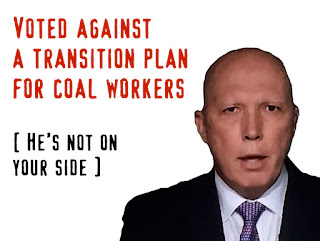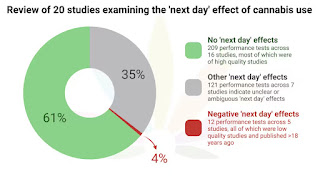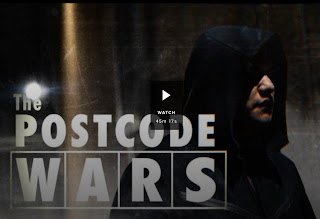The Liberal-National coalition seem to have settled on the spinstorm of mistruths they will rely on to elect Peter Dutton in April or May this year.
It's a cleverly constructed barrage of shallow populism that relies on their target voters being ignorant or forgetful of recent history. It pretends that the Big Money party cares about the average worker, when in fact its
voting record consistently favours the very rich at the expense of the rest of us.
One core lie is that the last seven quarters of per-capita ("household") recession is a record, all of course all Labor's fault. The term 'household recession' which they have adopted is meaningless, because every recession is a household recession. The correct term is 'per-capita recession', ie where economic growth is less than population growth, which in turn is driven by migration, which Dutton wanted to cut. It means the economy per person is going backwards.
This lie ignores that we had a per-capita recession for almost the entire term of the last LNP government, pre-covid. That's why interest rates were near zero for years, an attempt by the Reserve Bank to stimulate the economy. During this time the national deficit also increased each year, despite Tony Abbott's election lie about Labor's 'debt and deficit crisis'.
Peter Dutton is claiming that Labor's strengthening of public service capabilities and numbers by about 30,000 is driving inflation, interest rates and increasing taxes.
Taxes first: Albanese last year changed LNP laws to deliver tax cuts to every worker, so that's one clear lie.
The LNP spin also ignores a large corresponding reduction in spending on "consultants" like PwC and the big four accounting firms. They conveniently forget the PwC scandal whereby the LNP brought them in to help increase the tax take from multinational corporations, only to see them use that inside knowledge to sell strategies to the very same corporations aimed at avoiding higher taxes. Result: The government remains short of money, is in higher debt and regular workers continue to pay the lion's share of tax.
This also ignores that the LNP had deliberately hollowed-out and de-skilled the public service, resulting in huge problems such as a backlog of a million unprocessed immigration visas, a mess that Labor is sorting out, and a similar backlog in claims by defence personnel
Now for interest rates. Dutton and shadow finance minister Jane Hume blame Labor for extended high interest rates, because Labor's cost of living relief is apparently fuelling inflation. Never mind that studies show that measures like energy price relief for every household went into paying energy bills, savings or paying down debt, none of which is inflationary and so has not affected interest rates. Never mind Labor's two surplus budgets, which were used to pay down Liberal debt.
The LNP are clear however that they intend to cut taxes and government spending, including cost-of-living relief. So-far the only tax cuts announced are for bosses to enjoy tax-free long lunches, presumably while the workers toil away in the factory or office. Liberal ideology says this will "unleash" the economy and make us all "prosperous". It's almost as if businesses are like savage dogs straining at the leash of taxes and regulation. They don't explain how cuts can fix external pressures like Putin's energy price hikes, spiralling insurance costs driven by climate change or shipping obstructions caused by Houthis attacking cargo ships in the Suez canal. The LNP never suggest that business owners might simply pocket the extra money, buy a second yacht or invest it in unproductive property speculation.
A big and rising cost for voters is insurance premiums. Claims in Australia due to extreme weather have tripled in the past three years and premiums are becoming unaffordable for many, if indeed their homes are insurable at all. Extreme weather is a long-predicted effect of climate change. The unprecedented LA wildfires have destroyed to date over 12,000 buidings and killed more than 24 people. Insurance costs from this event alone are predicted to drive global rises in insurance premiums.
 |
Some of the 12,000+ buildings destroyed in LA
|
The Liberals ignore this and in fact want to make the climate worse by opposing clean renewable energy in favour of fossil fuels. They plead their fissile fantasy of cheap, clean nuclear energy but this joke policy has been well exposed elsewhere. Never mind that it would be entirely taxpayer-funded, a strange contadiction in the LNP's low-tax private-enterprise ideology.
Dutton and useful idiot Angus Taylor have both lied that their fissile fantasy would reduce energy bills by 44%, citing the freebie Frontier Economics analysis they commissioned. The report says nothing of the sort, but hey, credulous voters won't check and Murdoch media will megaphone the lies, which is what the LNP is counting on.
Dutton also lies that Ontario's energy bills are far lower than Australia's because of the state's nuclear plants. But he does not mention that the state subsidises these bills by $8bn per year and that building them sent the state generator bankrupt.
Meanwhile Labor's Anthony Albanese seems stuck in an old TV-era pattern
of what Crikey has called 'deliverism', endlessly banging on about good
policies they have delivered. His own delivery sounds like the 1975
Treasurer's report at the Dubbo RSL AGM, so it does not cut through in this digital era of personality and populism.
I know it's old-fashioned to care about truth and reality but the rubber has to hit the road at some point.

















































